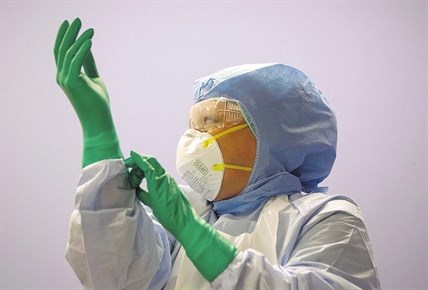
A health care professional pulls on a third pair of gloves during a demonstration of Personal Protective Equipment procedures at Toronto Western Hospital.
Image Credit: THE CANADIAN PRESS/Chris Young
October 21, 2014 - 12:42 PM
KELOWNA - Kelowna General Hospital is one of five B.C. hospitals training staff on the protocols required to deal with Ebola should the disease make its way into the province.
Health Minister Terry Lake issued the update about the health care system's preparation Tuesday.
"Our Ebola preparedness task force has been meeting regularly, and has been reviewing B.C. protocols to respond to the unlikely occurrence of a case of Ebola arriving in the province," Lake said in a media release. "The task force, in consultation witht the health authorities, have designated the following sites as regional centres to assess those at higher risk of having Ebola and to treat confirmed Ebola cases."
The four other regional hospitals participating in protocol training are Surrey Memorial Hospital, Royal Jubilee Hospital, University Hospital of Northern B.C. and B.C. Children's Hospital.
Lakes said focus will be on training staff and health care workers who will be engaged with a confirmed patient or patient under investigation. As well, emergency room and front line staff at all other health care facilities will be trained to receive, islolate and triage any symptomatic people with a risk of exposure to Ebola. Guidelines were revised following review by the task force, including updates to personal protective gear.
"These updated guidelines have been developed with advice from the Public Health Agency of Canada's national expert group. Staff will be fully covered, with no skin showing - equipment will include full body suits, long, fully impervious gowns, separate level 4 hoods, face shields, surgical masks and N95 respirator masks. Protocols will also include a buddy system for staff - where one staff member will observe the other donning and doffing protective equipment to ensure there is no risk for self-contamination. Staff will be trained in these protocols," Lake said.
"As well, the task force has organized weekly stakeholder engagement teleconferences with affected regulatory colleges - including the College of Physicians and Surgeons, the College of Registered Nurses of BC and the College of Licensed Practical Nurses of BC, bargaining associations - including the BCNU, HSA and HEU, the Doctors of BC, the BC Professional Firefighters Association and the Fire Chiefs Association of B.C., to provide information and answer questions regarding our Ebola preparedness.
"B.C. officials continue to work with their colleagues across the country and with the Public Health Agency of Canada to ensure consistent development and use of best practices.
"I want to thank everyone who is working to ensure B.C. is prepared in the unlikely appearance of a case of Ebola. The risk remains very low, but our vigilance remains high."
News from © iNFOnews, 2014